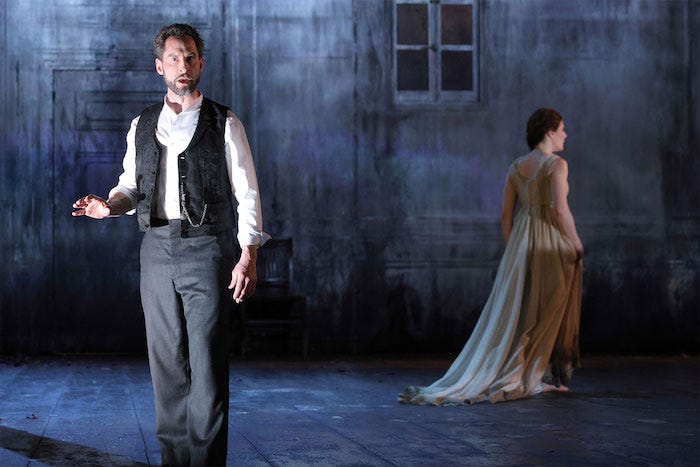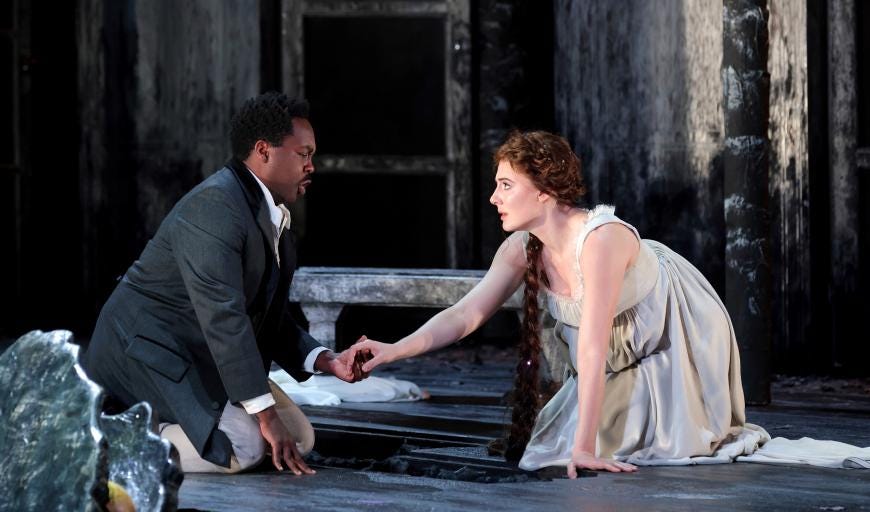
By Donna Perlmutter
A bare, somber room with brushed aluminum walls reveals a bed off to one side. A girl lies in it. A man stands removed from her. He speaks of being in an unknown part of the forest. She, also, says she’s lost in the forest.
Forgive the confusion, folks. We’re not in a forest. All is metaphor.
This is Debussy’s “Pelléas et Mélisande,” in a magical David McVicar production now at the Music Center Pavilion, courtesy of Los Angeles Opera.
Of course it’s the gestalt, not just this staging, that delivers the impact. It’s the enrapturing music -- led by Conlon at his very most inspired, at his best, and compellingly played with orchestral plushness, filigree and layered dynamism. It’s the work itself, which is unique in all the literature and based on the great play by Maurice Maeterlinck.
Have you heard what Debussy conjured in “La Mer,” that miraculous sea drama with its stormy currents, its demons, its unending nuances, its depths, its intricate liaison from one element to another, its glacier-like peacefulness?
Well, here, that musical instinct comes to narrative life. Yes, but not in the simple realism of Puccini or Verdi, not with select arias, duets, quartets, etc. -- but as a wholly integrated entity, and one that also peers inside personal intimacies.
You see, “Pelléas” is a darkly ominous dreamscape. The room is a forest. The characters are lost and illusory. In fact, they mingle. They are drawn to others, they relate to others, or not -- in mysterious ways, with meanings revealed only in the symbols of poetic language.
When we last saw the work staged at the Music Center, in 1995, the local/ international headlines and courtroom trial TV coverage reeked of the double murder committed by football star O.J. Simpson -- that of his divorced wife and her boyfriend. Irresistibly, director Peter Sellars invoked the same Malibu/Brentwood tableau and its famous, racially mixed residents.
Sellars even cast a black baritone as the opera’s raging villain, depicting him in an unforgettable yet ever-so-subtle image of menace. All of it brought to mind, of course, the Shakespeare/Verdi “Otello,” a black hero whose fatal weakness led him to fantasize his wife’s adultery. All of it bore an excruciating likeness of the Strong Man flaw: a wife’s betrayal -- albeit imagined -- as the worst crime.
Well, the “Pelléas” now onstage will bring you back to poetic reflection.
Like a stanza, each of Debussy’s many short scenes suggests a camera’s shutter-click, with the black square frame closing in at the end -- a stunning device. But the main power is there in the music and the words (readable in the titles), also seen in Vilhelm Hammershoi-like painterly atmospherics and Rae Smith’s modular unit set: the interiors of a decaying manor that contains characters who try but do not succeed in reaching peace with each other.
Still, you will not feel indifferent when the tormented half-brother Golaud speaks of Mélisande’s eyes, “eyes bigger than innocence, eyes of a lamb, eyes that give god lessons in innocence.” How powerful they are, he says, how overwhelming and defeating.
What’s more, you will not feel indifferent, when Mélisande refers to the wedding ring he put on her finger merely as “a gift,” throwing it playfully in the air as she frolics with his younger brother Pelléas.
Nor will you overlook Golaud’s alternating perceptions as he watches the two from a distance. First, he hopefully calls them children, children playing, children kissing each other as children do. Then the fear strikes him -- that they are adult, that their interaction is sexual.
Even at her death bed, this husband, after killing his half-brother, anxiously beseeches her: “Are you guilty?... of a forbidden love.”
That it took Debussy 10 years to write his only opera is not hard to understand -- it’s magnificently put together. The words fall together with the music so naturally. Especially in these rare performances, Conlon and his cast exemplify that.
Kyle Ketelsen, as a daunted and especially vulnerable Golaud turned rageful, sang with just the right oblique resonance and modulation at the start. Will Liverman, a Pelléas whose baritone easily embraces the high tessitura, came across as the more active, if less adept, brother. And soprano Sydney Mancasola, an aptly skittish Mélisande boasted a complimentary febrile tone.
Only Ferruccio Furlanetto, as Arkel, lacked the style of French fluidity in his phrasing and mangled the language to boot, while Susan Graham, in the maternal role of Geneviève, seemed to be having an off night vocally.
But before it’s packed up and sent away “Pelléas et Mélisande” runs at the Music Center Pavilion through April 16. It would behoove even the accidental adventurer to drop in.




